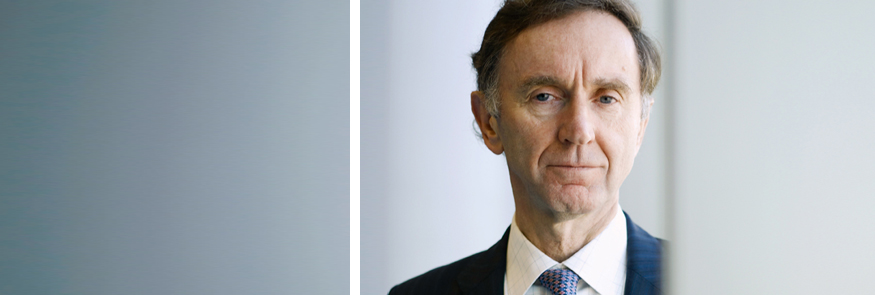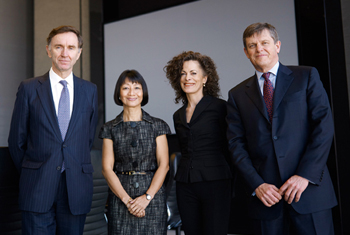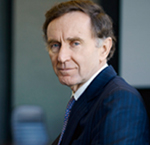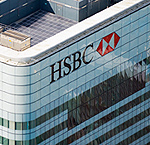Interview with Stephen Green, HSBC
“Anybody who thinks that you can pull up drawbridges is kidding themselves.”

1
THE FOCUS met HSBC Chairman Stephen Green in London to talk about changing leadership qualities and lasting values, as well as personal and corporate resilience in times of prevailing uncertainty.
NOW THERE’S a coincidence: we met Stephen Green in the lift. Ever a loyal servant of his sovereign, he had just come back from Buckingham Palace. Without stopping to catch his breath, he launched into our interview with a verbal portrait of the globalised world, reviewing the shifts of power and political perspectives. Then he opened a window for us on HSBC’s unique corporate culture and the demanding requirement profile that individuals face in a corporate and personal context, before rounding off with a touch of philosophy – complete with Faust’s pact with the devil.
The Focus: Resilience has become a keyword in the current management debate. Never has the topic been as immediately relevant as it is now in times of crisis – particularly when we look at the world as a whole. How do you see the shift in geographic influence and how are the western industrialised nations going to cope?
Stephen Green: There is indeed a shift going on in the world’s centre of gravity. From a historical perspective though, while it’s a huge change, in some ways it’s a reversion to a status quo ante. In 1820 China was the largest economy in the world; in 2020 it’s going to be the largest economy in the world.
The Focus: To what extent is that due to the global financial crisis?
Green: The financial crisis has if anything accelerated the shift. This isn’t just a story about China, though. It’s not even a story about Asia. Brazil, for example, is another country that’s on the move and we’re even beginning to see considerable growth in momentum in Africa. These things are all tied together. One of the facts about Asia is that it’s relatively poor in natural resources. Hence the beneficiaries of rapid Asian growth are places like Brazil, which is a major exporter of iron ore, not to mention soya beans, and self-sufficient now in energy; and of course you’ve got the Middle East, the world’s largest source of hydrocarbons. So the growth of trade and investment amongst the emerging markets, as well as the shift of investment from the west to the east are the big phenomena, economically and financially, of the first half of this century.
The Focus: That sounds as if it’s going to call for a good deal of resilience on the part of the key political players…
Green: It certainly is. In terms of political international relationships there are obvious impacts of all of this. The rise or re-emergence of countries on the world stage, whose voice is profoundly important to solving common problems of humanity, is manifest in the emergence of the G20 as the main international governmental coordinating group to deal with the crisis. And implicit in this is the relative marginalisation of the G7 and G8. We’re rapidly leaving the era when there was one global super power and one kind of economic bloc that could determine what happened in the world at large.
The Focus: So how do you see the traditional power blocs coping with that?
Green: It poses significant challenges for the traditional power blocs and traditional centres of economic gravity on all sorts of levels. For governmental relations, on matters of trade and investment policy – not to mention issues like climate change – it clearly poses an issue for every single business in the world. It’s about opportunities; it’s about threats; it’s about the need to adjust.
The Focus: That sounds like change at all levels…
Green: Not least at the level of individuals – when you think about the implications for how you determine what kind of skills you need to compete in modern life or what kind of career you can expect to follow. Anybody who thinks that you can pull up drawbridges and maintain a simpler world is kidding themselves.
The Focus: On the other hand, there is also concern that nothing will change – in the sense that no lessons have been learned from the crisis. The perhaps superficial outside impression of the financial services sector is that people have returned to “business as usual”.
Green: I don’t think there is any risk of that. A back to basics of sound banking, yes. But back to the bad practices of the early part of this decade, no.
The Focus: What makes you so sure?
Green: The markets wouldn’t tolerate it; the regulators wouldn’t tolerate it. A massive programme of reform is under discussion. You will see the outcome of that, I suspect, by year-end in terms of enhanced capital requirements in the system, stronger liquidity parameters and controls on leverage of one sort or another. While a lot of details still have to be sorted out, there’s no way the financial sector is going to go back to business as usual. I see last year as a year of transition, in the sense that the sector was stabilised. This year will be a year of major debate about how to strengthen the system to prevent any recurrence of the kind of crisis that struck.
The Focus: What are the key issues in that debate?
Green: The first point to say is that there is no alternative to the markets as the main engine of economic and social development. Churchill famously said about democracy that it was the worst system except for all the others. That’s also how I see the market system: it’s the worst system except for all the others that have been tried. It is a system that, at its best, drives a huge amount of economic and social development.
The Focus: So the greatest resilience actually lies in the market system itself?
Green: Absolutely. At its best, in places like China and India it has lifted hundreds of millions of people out of poverty. At its worst, it can be destructive and volatile – and at a deeper level it can easily poison human relationships, if you’re not careful.
The Focus: You’re surely not advocating a kind of neo-liberalism, though?
Green: Not in the least! In the last, say, two decades, there has been a market fundamentalism around that said: If I’ve got a contract, if I’ve got a product and there’s a market for it, I don’t have to ask any other questions about rightness or suitability. I don’t have to have any other relationship with the person who takes the product, because they bought it in the market and that’s that. This particular ethos, which spread through not just the financial markets but more generally through society in the last two or three decades, is quite a dangerous one for human well-being and social cohesion. It’s the context within which a lot of businesses lost sight of their real raison d’être; their reason for being in business.
The Focus: Is it about the difference between what’s legal and what is legitimate?
Green: It’s about how you understand the purpose of your activity in terms of the wider common good. This is the sort of discourse that would have been regarded as quaint, old-fashioned and irrelevant ten to fifteen years ago. Now it’s back at the centre of people’s attention – and quite rightly too.
The Focus: Are we witnessing a renaissance in values?
Green: I’d call it a renaissance of the desire to discuss what values in business should be. At the World Economic Forum in Davos the discourse tends to focus on culture, values and purpose, and is no longer just about market fundamentalism.
The Focus: You obviously think that’s a good thing.
Green: I certainly do.
The Focus: Has the crisis had any other impacts that you consider important?
Green: A lot more technical topics are on the table as a result of the financial crisis: how exactly do you define capital; how do you define liquidity; what is the right regulatory environment; and other macro-economic issues. The crisis did not simply arise out of excesses and frothiness within the financial markets; it was a product of global imbalances, and so there is a need to rebalance the global economy; a need for more consumption and less savings in the emerging markets, more savings and less consumption in more mature markets.
The Focus: Coming back to resilience: What’s the picture at HSBC? Were there perhaps behaviours linked to your corporate values that helped you come through this very difficult period better than others?
Green: It will be for business schools to generalise that point. But if you look at the banking world, you can’t actually point to a standard formula that always works. If you look at the institutions that have got themselves into difficulties, some are very big, some are very small; some are very broad in terms of their product range, some are very narrow. So there are no simple conclusions you can draw about the right template or business model. What I – and we as a company – strongly believe, is that some of the good old-fashioned principles by which we have always sought to run this company for the last hundred years – strong capital, strong liquidity, diversified business – have counted for quite a lot.
The Focus: And how do those enduring principles influence the way you see yourself as a financial institution and your wider role in society?
Green: Let me put it this way: I can point you to letters written by people who were in leadership positions in the Hong Kong Shanghai Banking Corporation in 1900, which articulate a sense of purpose and a sense of ethics that you wouldn’t want to change. There are various ways of describing and understanding the purpose of the business: you’re not a charity; you’re in business for profit in the shape of sustainable profitability, providing good and hopefully growing returns to your shareholders over the short, medium and longer term. So you need to focus on the long-term relationship with your customers. Secondly you have to invest in your people properly, and indeed invest in the business more generally, with a sufficiently long-term focus. Thirdly there are your responsibilities within the communities where you operate. Corporate social responsibility is essential to a genuine understanding of the real objectives of the business.
The Focus: So ultimately HSBC’s resilience is anchored in a culture that has evolved over the decades?
Green: One of the characteristics of this institution is an intense self-criticism, which you need, because you will not get it right all the time. What’s more, the landscape keeps changing and the environment keeps changing, so the moment you become complacent you’re doomed.
The Focus: How can one prevent a successful organisation and its people becoming complacent and make sure they are prepared to respond to the next crisis?
Green: It is part of the job of leadership to make sure nobody gets complacent. But you can’t prepare for crisis in the sense of ensuring that nobody ever takes any risks. You won’t make progress unless you take risks. If you take risks, then by definition some of the time things will go wrong, and you need to have enough buffers and enough strength to be resilient in the face of the unpredictable. You need a strong culture that is constantly self-critical.
The Focus: It’s a well-known fact that for you personally, Christian values are very important and lasting values appear to be a major factor in your company’s resilience. Would you say that – not least in business – people need a strong orientation towards values, and how can this need be met?
Green: The values that are relevant to business life are surprisingly universal. People want a human relationship as part of doing business; people want trust as a basis for doing business; people know that you can’t fool all of the people all of the time – although that doesn’t stop some people trying. People understand what the values are that make for a trusting, successful, durable business relationship, whether it’s between a large bank and a large company, or between the individual banker in a branch and the individual customer they deal with. We know what the truth is, and it doesn’t matter where you live or what cultural, philosophical or religious background you have. Is that important? Absolutely. Is it a basis for optimism? Yes, it is. If I go to Brazil, Mexico, China, India, Indonesia, Turkey, Britain, Germany… they’re all very different countries, but actually people want the same things. So you are simultaneously struck by the fascinating differences and by the commonality of understanding about what makes for really satisfying, sustainable, long-term business success.
“There is no more important task for senior management than to nurture and refresh the culture and values.”
The Focus: Do you think HSBC’s corporate culture and values will prove enduring despite all the diversity?
Green: Yes, I do, but we need to work at it. In fact, I would say there is no more important task for a board and a senior management team than to nurture and refresh the culture and values, and make sure the organisation remains constantly imbued with them. There is no more important task.
The Focus: How do you set about that task?
Green: As a board, once a year we look at two things: what our values actually are, and what they appear to be in practice. Once a year, management conducts an employee engagement survey handled by an external consultant and covering all 300,000 employees around the world. We get a very high level of participation. We ask a whole series of questions about all sorts of things: terms and conditions; how people feel about their job; how they feel about the hierarchy within which they operate; how they feel about the bank’s corporate and social responsibilities. From their responses we glean a pool of information about our strong points and about our weaknesses. For instance, the survey consistently shows a very broad delight in the commitment the bank has to philanthropic work, particularly in education and with regard to the environment. These kinds of things matter, and they are part of what it takes to ensure that there’s cohesiveness, and an enthusiasm for doing a good job. For the vast majority of people it is not enough simply to say, here’s a job and we’ll pay you for it. They actually want a sense of reward that is not monetary out of doing their job.
The Focus: How does external growth tend to affect people’s attitudes and behaviours? Has the increasing complexity of a larger post-merger organisation ever threatened to derail your corporate culture?
Green: Although we haven’t undertaken any sizeable acquisitions of late, each time we do, we need to ask ourselves: can we ensure that the ethos which is so important to the institution is spread through the newly acquired business? Are we confident that the newly acquired business won’t put that ethos at risk? We certainly wouldn’t want to grow the company at a pace which meant we lost the ability to ensure that our corporate culture remained strong.
The Focus: Thinking of recruitment in this context, is there a particular species of high potential that makes a perfect fit for your corporate culture?
Green: We are distinctive from other institutions in as much as we recruit relatively few people in midstream. Most of the people who lead the company have been with us for much or nearly all of their career. Personally I have only been with HSBC for twenty-eight years, but if you look at the group, our Chief Executive Mike Geoghegan joined straight from school and has been with the company ever since. Douglas Flint, the Chief Financial Officer, has been with us now for fifteen years. Compared with most of our competitors this is a very long-standing team, and that’s not unrelated to your point about corporate culture. When you look at it in terms of graduates, this is extremely important. You are clearly looking for people who resonate with the approach to doing business that is anchored in your culture; people who are fundamentally turned on by the thought of internationalism and globalisation, the thought of the world as a great crossroads; people whose eyes light up at the fascinating, kaleidoscopic complexity of the world. It’s for that kind of people that we devised our International Management Programme for graduates. The experience of being recruited as a graduate and expecting to spend your career internationally mobile puts you in a most remarkable position in terms of leadership in a highly internationalised world.
The Focus: Would you say there’s a specific kind of DNA that pervades HSBC’s corporate culture?
Green: The way I see it, our culture is the glue, the underlying network that holds us all together.
The Focus: When we meet senior executives, it often seems that, for a variety of reasons, they are subjected to increasing levels of personal stress. Does that presuppose a need for ever-greater personal resilience in coping with these everyday pressures? Or are there perhaps signs of stress levels coming down again?
Green: I don’t think stress levels are ever going to fall, but everybody has their own way of dealing with stress. I don’t think you would be in senior positions in modern complicated businesses if you didn’t to some extent get energised by stress. You compare notes with other people: you hear people say, for instance, make sure your Blackberry’s switched off for at least one day a week. I think that’s a good idea. I do that on Sundays. If somebody needs to reach me really urgently, there’s always the telephone. Looking after yourself physically is important, too: daily exercise, the usual issues about diet and so forth. These are the obvious basics, particularly when you travel a lot. Personally I read a great deal – I don’t mean business reading; I read history books, I read philosophy books, I read novels, and I try almost every day, however late at night, to spend perhaps twenty minutes reading before I turn off the light.
“When times are challenging, threatening, stressful, is when you learn things about who you are.”
The Focus: We were interested to note that you drew parallels between Goethe’s Faust and the current crisis…
Green: Faust is a most extraordinary thing. It is one of the great archetypes of mankind. One way or another, so many people are tempted into the Faustian bargain, and it’s a very telling, cautionary story. It has also inspired the most outstanding works of art. Some of them are direct interpretations; some you have to think about before you realise they are the Faust story in another guise: Don Giovanni is the best example of that. What is for me Mozart’s greatest opera is a Faust story.
The Focus: As author of Serving God? Serving Mammon? would you care to share some insight on temptation?
Green: Well, none of us completely withstands temptation. But the point about these archetypal stories like Faust is that they speak to so many people. Another thing I derive from a Christian perception, although other people can derive it from other sources, is that none of us is perfect. None of us avoids all of these temptations, and while you shouldn’t get despondent about that, you should recognise it as a fact. That tells you about the need to be honest with yourself; to recognise when things have gone wrong; to recognise when it’s your fault, but also to recognise that you always have the chance of renewal and a fresh start. These kinds of profound truths about humanity are both true in their own right and actually quite important in the business environment. As we all spend a high proportion of our creative energy potential in the business environment, it’s not surprising that these fundamental human characteristics shape the way we work.
The Focus: Does the experience of successfully coping with a crisis actually build resilience?
Green: What is true is that we all learn something about ourselves in a crisis. When times are challenging, threatening, stressful, is when you learn things about who you are – and you learn about other people.

The interview with Stephen Green in London was conducted by (from left) Jackie Wong, Egon Zehnder, Hong Kong, Ulrike Mertens, The Focus, and David Kidd, Egon Zehnder International, London.
RESUMÉ Stephen Green

His rise from hard-nosed cost controller to grand seigneur of British banking (and Anglican lay preacher) can fairly be described as exceptional. Stephen Green (62) was born in Brighton on the south coast of England and studied at Exeter College, Oxford. He initially majored in German because of his passion for Goethe and German culture, but then switched to philosophy, politics and economics. After graduating, he worked for a year in a halfway house for recovering alcoholics in London. Here he met his future wife Jay, who was also a volunteer. From 1977 to 1982 he worked as a consultant for McKinsey, on assignments throughout Europe – primarily in Germany – North America and the Middle East. At the age of 34 he joined HSBC in Hong Kong. In March 2003, Green was appointed Chief Executive Officer of HSBC. At his side was Chairman Sir John Bond, with whom he worked closely in running the group. When Sir John retired at the end of November 2005, Green succeeded him as Chairman. Stephen Green has served as Chairman of the British Bankers’ Association and has been a member of the Prime Minister’s Business Council for Britain since it was founded in 2007. He is also a trustee of the British Museum. His publications include Serving God? Serving Mammon? in which he offers his interpretation of the Gospels and the world of finance, concluding that the two are not necessarily incompatible, and Good Value: Reflections on Money, Morality and an Uncertain World.
HSBC The world’s local bank

HSBC The world’s local bank
The Hongkong and Shanghai Banking Corporation (HSBC) opened its doors for business in 1865. The initial idea for the bank came from a Scottish businessman, but the merchants who were both its first customers and shareholders were drawn from the many nationalities trading in the South China Sea. The new bank, based in Hong Kong, quickly established a network of branches in ports throughout Asia and into Europe and the U.S., following its customers to find business. Its reputation grew as it began providing financial support and loans to Asian countries, and by the early twentieth century it was the foremost financial institution in the East. In the changed post-war world the bank sought new opportunities for expansion as its China market contracted. Acquisitions in the 1950s in the Middle East and India began the transformation of HSBC from a regional bank to an international business – the purchase of Midland Bank in the UK in 1992 signalled a step change in this process with the move of HSBC’s head office to London. HSBC is now represented in 88 countries and territories across the globe with almost 300,000 employees speaking over 100 languages. The bank has emerged relatively unscathed from the global financial crisis without having to accept government bailouts. Chairman Stephen Green refused to become involved in the excesses of the financial markets, and events have since vindicated his steady approach.
PHOTOS: JÜRGEN FRANK





